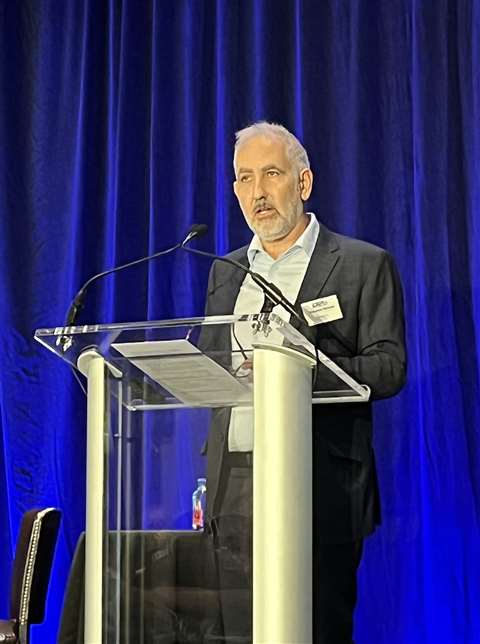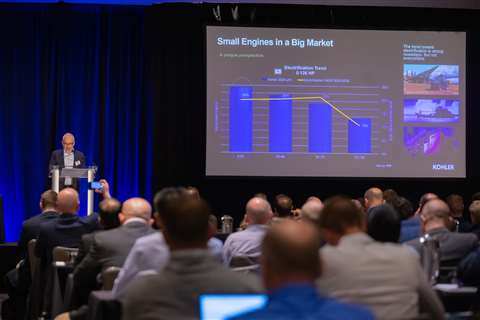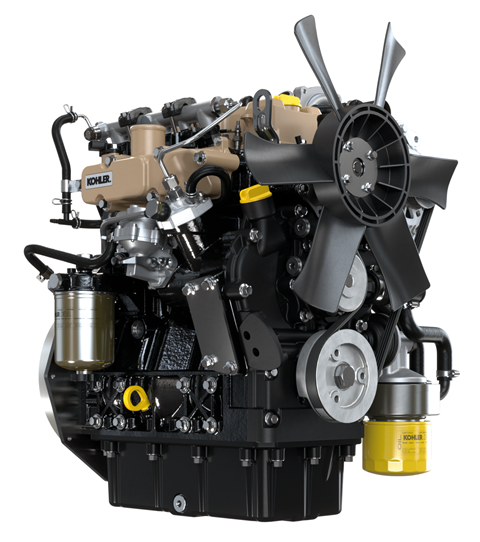Kohler’s Vincenzo Perrone says decarbonization calls for IC’s transformation
07 October 2022
 “Our commitment to decarbonization... does not mean that we have to set aside the internal combustion engine technology. It means we have to transform it.” - Vincenzo Perrone, president, Kohler Engines. (Photo: Becky Schultz)
“Our commitment to decarbonization... does not mean that we have to set aside the internal combustion engine technology. It means we have to transform it.” - Vincenzo Perrone, president, Kohler Engines. (Photo: Becky Schultz)
While engine manufacturers have made significant improvements in fuel efficiency and exhaust emissions, the new challenge it is confronting is the energy transition. “As companies, we are facing the reality and the facts that are acting in the direction of progressive decarbonization,” said Vincenzo Perrone, president, Kohler Engines, during his afternoon keynote address at the Diesel Progress Summit.
New technologies are emerging that will play an increasingly important role in the off-road industry, he told attendees of the 2022 Diesel Progress Summit in Rosemont, Ill. “Some of today’s technologies, we believe, can even replace internal combustion engines in some applications. Our commitment to decarbonization, however, does not mean that we have to set aside the internal combustion engine technology. It means we have to transform it.”
Influence of socioeconomic factors
Future energy demand will be driven not only by the need to reduce CO2 emissions, but by socioeconomic factors such as GDP, per capita income, population growth and urbanization, Perrone said. “When taking these variables into consideration… we will clearly see divergences between the needs of advanced and developing countries. In developing countries, there is a steady increase in the demand for energy; resources are very scarce and [there is] continuing heavy reliance on fossil fuels.”
As a result, he added, “We know that developing countries will need simple and reliable diesel and gasoline solutions for a long time to come.”
Consequently, Kohler’s internal combustion engine development has focused on increasing performance and efficiency and, most importantly, criteria pollutants. Yet, the company is in a unique and, in some ways, challenging position, said Perrone, given that nearly all its engine fall into size ranges where electrification, batteries and even fuel cells are seriously discussed.
 Vincenzo Perrone, president, Kohler Engines, speaking to attendees of the 2022 Diesel Progress Summit. (Photo: KHL/Joe Mather)
Vincenzo Perrone, president, Kohler Engines, speaking to attendees of the 2022 Diesel Progress Summit. (Photo: KHL/Joe Mather)
“Some applications we certainly believe are ideal candidates for that transition. We are thinking about machines that operate in urban environments with low duty cycles and you know the infrastructure is available. Those type of applications will lead the adoption of electric powertrains,” he said.
For the company’s larger engines (up to 130 hp) typically operating in higher duty cycle applications, internal combustion technology will continue to be the most cost-effective solution due to the amount of energy that can be stored on the machine, as well as its reduced mass and weight and faster refueling time compared to an electric powertrain.
Transition to alternative fuels
For the future, Kohler plans to develop solutions that will enable its engines to transition to low carbon fuels with minimal impact on its customers. “We see a lot of interest from our OEM customers in alternative fuels, hydrogen, hybrids and also natural gas solutions. We believe that the next generation of powertrains will be based on a combination of sustainable internal combustion technologies,” Perrone said, evolving from today’s diesel and natural gas engines to biomethane, e-fuel and more. Kohler also plans to continue improvements in its smaller engines, such as the addition of electronic controls in its KSD line.
“We are developing hydrogen engines with the same power and torque density as diesel as well as natural gas and biogas engines. We will also continue to invest in diesel engines,” Perrone said. “But also, [we will] expand capacity, as we continue to see an increase in demand for diesel engines in the future.”
Hybrid engines are currently in development, as well. “So, our technology portfolio will be capable of dealing with this multi-energy, multi-fuel society of the future,” said Perrone.
 In addition to other developments, Kohler plans to continue improvements in its smaller engines, such as the addition of electronic controls to its KSD diesel line. (Photo: Kohler Engines)
In addition to other developments, Kohler plans to continue improvements in its smaller engines, such as the addition of electronic controls to its KSD diesel line. (Photo: Kohler Engines)
Technology neutral approach
When it comes to new technologies, it’s clear there is not ‘one size that fits all.’ “We believe that a technology neutral approach is the key, because the right level of technology really depends on the application, the range of the vehicle, the region where it’s going to be sold, the incentive scheme that is present in that particular market,” Perrone said.
While he acknowledged the most immediate path to achieve CO2 emissions reduction is to evolve low-carbon fuels such as hydrogen or e-fuels, “our mission is to push the development of internal combustion engine technology as a bridging technology with the use of sustainable fuels, in addition to the development of electrified solutions.
“To that extent, an internal combustion engine really serves as enrichment technology in order to mitigate the risk of any obstacles in a transition to more disruptive technologies,” he continued. “And from that perspective, internal combustion engines will evolve from being the main source of power for a machine to a key component of a complete power system that delivers the performance and the features that the customer [requires]. So, we see a future of multiple powertrain solutions and multiple fuels.”
With this, new opportunities will emerge. “It’s like the ‘Engine Big Bang.’ This Big Bang is not a hard and fast beginning but a moment of profound transformation very different from what most of us have experienced with the past,” Perrone said. “We are also very certain that internal combustion engines will play a key role in industrial applications for a long time to come, especially in those applications where there is a high demand for mechanical power and energy.”
STAY CONNECTED




Receive the information you need when you need it through our world-leading magazines, newsletters and daily briefings.
POWER SOURCING GUIDE
The trusted reference and buyer’s guide for 83 years
The original “desktop search engine,” guiding nearly 10,000 users in more than 90 countries it is the primary reference for specifications and details on all the components that go into engine systems.
Visit Now
CONNECT WITH THE TEAM










